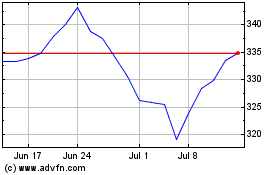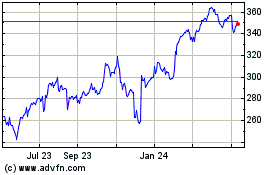Cigna Study Details How Incentives Help American Workers Engage in Improving Their Health & Making Their Health Care More Aff...
September 22 2015 - 10:30AM
Business Wire
- Three-year Cigna study shows to the
dollar how a handful of correctable health conditions contribute to
the health care costs of American workers
- Study provides evidence that those with
unhealthy biometrics -- and those who have not completed biometric
screening measures – are more likely to incur high costs
- Findings provide evidence that
incentive programs can lead to better health engagement and
behavior, clinical outcomes and costs
The bad news: higher weight, cholesterol, blood pressure and
blood sugar can raise health costs and out-of-pocket health
expenses. The worse news: what you don’t know about your health
could be even more costly to you.
This Smart News Release features multimedia.
View the full release here:
http://www.businesswire.com/news/home/20150922005930/en/
The good news is there are health improvement programs and
incentive strategies that are proven to help people address the
conditions which increase costs, according to a three-year study of
health plan consumer data by global health service company, Cigna
(NYSE:CI).
Where health meets costs
The Cigna study of 200,000 customers shows how a handful of
correctable health conditions, as indicated by unhealthy
biometrics, can contribute to their average annual health care
costs:
- A body mass index (BMI) of more than 30
increases total health care costs by an average of more than $2,460
per customer per year, and adds $492 in annual out-of-pocket
costs.
- A cholesterol reading of more than 240
translates into an average total health care cost increase of
$1,644 per health plan customer per year, and adds more than $353
in annual out-of-pocket costs.
- Two or more chronic conditions
indicated by unhealthy BMI, blood pressure, cholesterol, and blood
sugar raises annual out-of-pocket expense by almost $1,300 per
year, and total healthcare costs by nearly $9,000 per year.
The cost of not knowing
When it comes to health conditions, those who have not undergone
a biometric screening have higher health costs. For example,
- Those who have not had a biometric
screening of their blood pressure values on average have total
health costs which are $2,064 higher per year, and $400 more in
out-of-pocket costs, than those who have verified that their blood
pressure is lower than 140/90.
- Those who have not had a biometric
screening of their blood glucose values on average have total
health costs which are $1,332 higher per year, and $266 more in
out-of-pocket costs, than those who have verified that their blood
glucose is lower than 100.
“In too many cases our health and costs are getting worse, but
it’s also in our power to change that,” said Cigna's Chief Nursing
Officer, Mary Picerno. “Yes, we have to work hard, and have to do
things we haven’t done before, but still, we can change it. And
when we do, there can be financial rewards, along with the ultimate
reward of better health.”
Lowering health costs today by preventing health issues
tomorrow
Notably the study shows how incentive programs – such as
consumer premium discounts, or health spending account funds --
play a key role as the impetus for individuals to participate in a
biometric screening, to engage in healthier behaviors, and improve
their clinical outcomes and costs. According to the Cigna
study:
- Incentives more than doubled biometric
screening rates from 20 percent to 55 percent in 2014
- Incentives increase the probability of
engaging in a coaching program by 24% and in particular by 30% for
populations who have chronic conditions
- Incentives significantly increase the
probably of setting and meeting goals with a health coach, by 18%
and 43% respectively
- Incentives increased the probability of
meeting biometric targets:
- BMI less than 30 – an improvement of
nearly 36 percent
- Total cholesterol less than 240 – an
improvement of nearly 11 percent
- Blood pressure less than 140/90 – an
improvement of more than 47 percent
- Incentives reduced total medical costs
by approximately 10% for those 50+ years of age or with chronic
conditions
“Employers are increasingly rewarding employees who identify and
address their potential health risks, by discounting the employee’s
health plan premiums or adding funds to their health spending
account to lower their annual out-of-pocket expenses,” said
Picerno. “In 2014 Cigna distributed more than $80 million in
rewards to Cigna group health plan customers who completed 1.6
million health goals. In the first eight months of 2015, Cigna
customers have earned $93,814,080 in awards through their employer
incentive programs.*”
* Cigna internal data, Do Incentives drive engagement, health
and financial outcomes? September 1, 2015
About Cigna
Cigna Corporation (NYSE: CI) is a global health service company
dedicated to helping people improve their health, well-being and
sense of security. All products and services are provided
exclusively by or through operating subsidiaries of Cigna
Corporation, including Connecticut General Life Insurance Company,
Cigna Health and Life Insurance Company, Life Insurance Company of
North America and Cigna Life Insurance Company of New York. Such
products and services include an integrated suite of health
services, such as medical, dental, behavioral health, pharmacy,
vision, supplemental benefits, and other related products including
group life, accident and disability insurance. Cigna maintains
sales capability in 30 countries and jurisdictions, and has more
than 89 million customer relationships throughout the world. To
learn more about Cigna®, including links to follow us on Facebook
or Twitter, visit www.cigna.com.
View source
version on businesswire.com: http://www.businesswire.com/news/home/20150922005930/en/
Cigna CorporationJoe Mondy,
860-226-5499Joseph.Mondy@cigna.com
Cigna (NYSE:CI)
Historical Stock Chart
From Mar 2024 to Apr 2024

Cigna (NYSE:CI)
Historical Stock Chart
From Apr 2023 to Apr 2024
